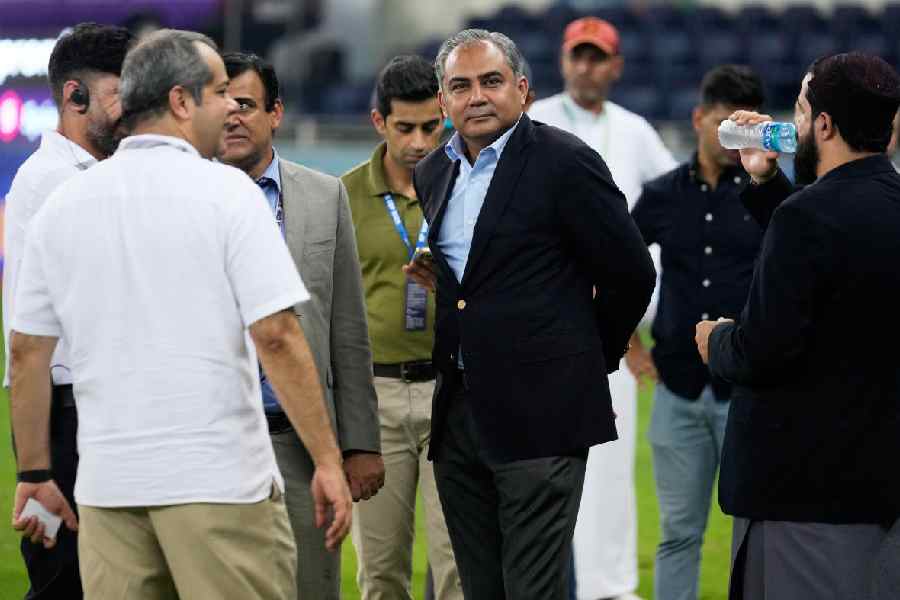|
|
Airtel’s Lifestage festival, surviving into its second year while other sponsors cut their theatre budgets, achieved the rare feat of delivering something new in such festivals by bringing some playwrights whom Calcutta had never seen previously, and by supporting younger talent rather than the no-risk marquee projects that normally come here. But since it re-invited three groups from last year, next time it should distribute favours more equitably.
It stood to reason that the best-known and oldest of the three English-language troupes, Rage from Mumbai, directed by Rahul da Cunha, drew a standing-room-only audience. They have, of course, performed here before, but this time they brought an original dramatist whose work we had not seen: Anuvab Pal, ironically a local product and stand-up comedian in his own right, who regaled the spectators with his curtain-raiser of jokes at Bong expense.
However, his play, Chaos Theory, bore more than faint resemblances to the plot of A.R. Gurney’s Love Letters. Two undergraduates at St Stephen’s grow very close, not realizing that they love each other; or, perhaps, realizing but never expressing their feelings, even later when they both move to the US. They marry other people, but the marriages don’t work. Yet they still cannot get together after three decades. Moreover, I found it rather incredible that the woman (Anahita Uberoi) flipped for a confirmed wino (Zafar Karachiwala) who, to make an impression, misquoted poetry, which she always knew. Stephanians strutting their stuff should protest the implication that no intelligent men graced their portals in that period.
Most disconcertingly, the soundscapist did not research the songs that functioned as chronological markers, placing Three Dog Night’s “Joy to the World” (1971) and Presley’s “Hound Dog” (1956) alongside the 1960s, and Van Morrison’s “Brown-eyed Girl” (1967) alongside the 1970s. Although the four-member cast acted well, I was happiest with the man’s flaky American student (Shaana Levy, who exhibited good skills at accents), while Sohrab Ardeshir made a smooth transition from callow fresher to Communist activist.
Akvarious Productions staged Rafta Rafta, adapted by them from Ayub Khan-Din’s script, which he in turn adapted from Bill Naughton’s comedy, All in Good Time (1963). Where Khan-Din had set the Manchester source in the British Hindu community, Akvarious converts the wife’s family into Muslims, adding an interesting inter-religious angle. Naughton’s original, and its movie remake, The Family Way, had courted controversy for outing nuptial impotence, and the subject remains relevant, though no longer taboo. Nevertheless, I have a problem with its resolution, in which rough anger cures the groom of his embarrassing difficulty.
Tahira Nath and Akarsh Khurana direct their young team (picture) stressing individual as well as social traits, making their portraits of the older immigrant parental generation quite convincing. Khurana himself takes the cake as the imposing Punjabi father who lords over his just-married son. But Kshitee Jog and Ahlam Khan (the respective mothers) come close, in their much quieter characters. Abir Abrar and Adhaar Khurana do the simpler job of enacting the newlyweds —nearer their own age — naturally too. In the ultimate analysis, the collective effort scores over the play itself.
Local groups must learn from the success story of Evam (Chennai), now a regular company. They returned this year with Chasing the Mamet Duck, “inspired by” David Mamet’s Beckettian one-act Duck Variations (1972), which first gained Mamet attention. Mamet is one of the most respected American writers today. They intercut slices from the original about two old men watching ducks and philosophizing, with videos shot in Chennai and a live pianist (Anil Srinivasan) playing far too well for the hackneyed warhorses that he chose. The entire production was an experiment in free-form impressionistic association and interaction — director Karthik Kumar calls it “trans-theatre” — which started in the lobby and continued on stage when Karthik solicited responses from the viewers. But by projecting films and using YouTube, does Evam effectively succeed in their objective to lure youth away from multiplexes? As for the essence of theatre, the two main actors (Karthik Srinivasan and Yudhishthir Rana) performed Mamet’s elderly men much too loudly for comfort.











